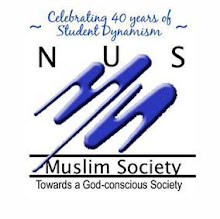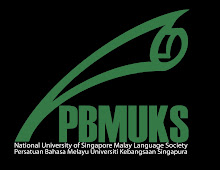
Date: Saturday 31st May 2008
Time: 2.30 pm to 5.30 pm
Venue: National University of Singapore
Yusof Ishak House
Function Rooms, 1
Speaker: Muhammad Haniff Hassan
Associate Research Fellow
S. Rajaratnam School of International Studies
Nanyang Technological University
Singapore. Material: Islam and Plurality.
http://counterideology.multiply.com/journal/item/29/Islam_and_Plurality
Ethics of Disagreement.
http://www.youngmuslims.ca/online_library/books/ethics_of_disagreement_in_islam/index.htm
The programme for the session is as follows:-
Programme
2.30pm Registration
2.50pm Welcome Address by Young AMP
2.55pm Personal Religious Orientations: Reconciling the Differences
Muhammad Haniff Hassan
Associate Research Fellow
S. Rajaratnam School of International Studies
Nanyang Technological University Singapore.
3.35pm Break for light refreshments
4.00pm Floor Discussion
5.30pm Closing Remarks



1 comment:
salaaam all,
Hope that those who came had benefitted from the session.
for those who unfortunately had to miss it - here is a brief summary of Ustaz haniff's presentation. The comprehensive review of the session will be available in due time.
There is a dire need to accept that differences in opinion does exist adn that each of them need to be respected. It is not possible for everyone to subscribe to a particular opinion. Texts are situation and context-bound - as much they are open to interpretations.
1) Diversity is natural, and there are many evidences in the Quran regarding this. Therefore we should live as it is and accept it, without attempt to homogenise.
2) Difference in opinions are caused by a few factors:
a) Nature of scriptural texts. There are verses which are qat’ii (beyond doubt), whose meanings are agreed upon by all domains of Islam. There are also verses which are zannii, with multiple interpretations. Between the two, there are less of qat’ii verses in terms of quantity and quality. Thus many verses can have multiple interpretations, and there may be more than one that is right.
b) God’s knowledge is infinite. However interpretations are based language, which is a human construct. Human constructs are finite. Thus the finite cannot accurately interpret the infinite. Therefore our knowledge of Islam is only based on textual meanings and interpretations within contexts.
c) Tools of interpretation differ among people. Eg Hadiths are different after being passed down.
d) Satan is a factor which makes people interpret texts according to their own desires.
3) There can be more than one truths. There is a single truth, but this is unknown until there is a consensus, therefore it is dangerous to, and we cannot, make claims of single truths. There are also multiple truths. Thus we cannot have a zero sum attitude, and must have the attitude of 1) agree to disagree and 2) humility. When we can agree to disagree, it opens up avenues of discussion. With humility, we can keep ourselves in check and not impose our opinions on others.
4) Absolutism is dangerous. Accepting only one line of thought and imposing it will lead to a holier-than-thou attitude, which in turn leases to antagonism and bigotry, before leading to takfir (denouncing another person’s faith), and later can lead to violence. To avoid violence, it is therefore important to avoid the absolutist mentality.
This presentation is meant to address the plurality of the Islamic faith – and is not an ultimate claim. There are many a time and many instances where plurality and relativism should not be wholly embraced.
Post a Comment